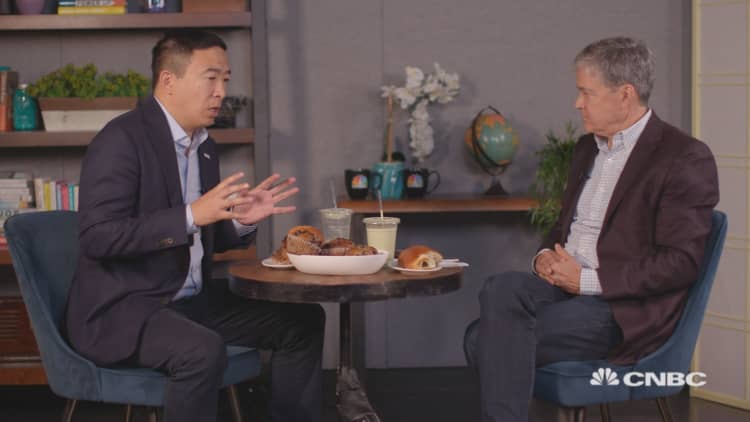Even though he's running as a Democratic candidate for president, Andrew Yang certainly has his differences with the party.
The entrepreneur and 2020 contender said in a Freakonomics interview published Wednesday that "putting money into people's hands is at odds with the Democratic Party."
Yang's signature proposal to give every American adult $1,000 a month is primarily how he differs from other Democrats on the ticket, he said.
"The Democratic Party has a lot of faith in programs and institutions where it's more likely to champion something like free college, even though only 33% of us will go to college, than just putting cash into people's hands," Yang said.
Yang last week became the final person to qualify for Thursday's Democratic debate, the last one of the year. Six others have qualified, but he will be the only person of color amid what was once a crowded field with the greatest diversity of candidates ever running for president.
Several outlets after multiple debates noted that Yang got considerably less speaking time than some Democratic leaders such as Sen. Elizabeth Warren and former Vice President Joe Biden. During the November debate, Yang ranked last in terms of speaking time among the candidates.
But even with limited speaking time and single-digit support in national polls, he said, "we've always had a really strong surge of support afterwards, regardless of how much I got to talk."
For Thursday's debate, Yang is sticking to his tried-and-true strategies, opting to discuss policy on the stage, he said, rather than sparring with a candidate by "using rehearsed attack lines that invoke the name of other candidates and then you have a tit-for-tat spat."
In the interview, Yang also discussed President Donald Trump's meetings with dictators. Such meetings drew criticism during the November debate, when South Bend, Indiana, Mayor Pete Buttigieg ripped into Rep. Tulsi Gabbard for meeting with "murderous dictator" Bashar al-Assad, the Syrian president.
"I do not mind the fact that [Trump] sat down with dictators like Kim [Jong Un]," Yang said. "I think that he should have gotten much more out of sitting down with them than just a photo op. But the fact that he is questioning established practices to me is not intrinsically a bad thing."
Yang said Democrats generally believe that Trump should be the focal point but that Trump won the 2016 election because he recognized that "D.C. has stopped serving the American people."
"People in D.C. will succeed whether the rest of us succeed or fail. And that message really hit home for many, many Americans," Yang said. "And unfortunately, the Democratic response seems to be, 'D.C. is not the problem, Trump is the problem.'"
That doesn't mean Trump's actions should be celebrated, however, Yang said.
"When I go around campaigning around the country, I cannot tell you how many heads nod when I talk about how their lived experience has nothing to do with corporate profits, the headline unemployment rate, or GDP," he said.
"We know that a lot of the headline economic numbers are due to the $1.5 trillion tax cut, the vast majority of which went to big companies. So if you have a sugar rush because of an irresponsible tax cut, you shouldn't be celebrating. I mean, anyone could have predicted that," he said.
Trump championed his $1.5 trillion tax cut that was signed into law in 2017, but Democrats criticized it heavily for going to top earners.



